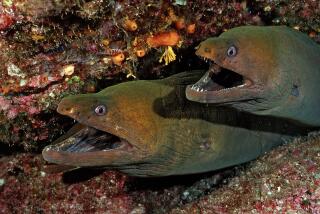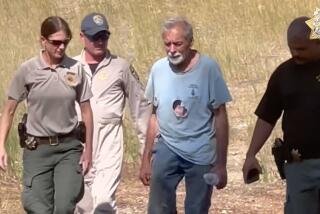A Shy Wally the Alligator Takes a Dive
Wally, a 6-foot alligator that has been patrolling Upper Newport Bay and San Diego Creek for the past two years, has gone underground.
Or at least underwater.
“You used to be able to just drive by here and you’d see him in the same spots,” said Carl Wilcox, a wildlife biologist for the California Department of Fish and Game, standing alongside a bank of San Diego Creek near the Irvine campus of the University of California.
“But he’s pretty shy, and with all the people and television cameras around lately--well, he just needs to go underwater, and you’ll never know he’s there.”
Believed to be a former pet who outgrew his owner’s accommodations or courage, Wally has not been spotted since last weekend, when an attempt to capture him with nets, ropes and a possum carcass failed.
Friday evening, Wilcox, in knee-high rubber boots, was combing the cattail along the creek bed for alligator tracks, hoping to pinpoint the reptile’s newest haunts for another weekend capture effort. But Wally was nowhere to be seen. Only an occasional mullet broke the surface of the greenish brown water, as black-crowned night herons fished stone-still and great blues flapped gracefully out of the tall grass.
The search will go on. But if Wally knows what is in store for him if he ever is captured, he may never surface from his idyllic hideaway.
The Santa Ana Zoo has no alligator pit, so it can’t take him. The Los Angeles Zoo “has a group of alligators who are already very well adjusted to each other,” said zoo director Warren Thomas. “Some of them are over 10 feet long, and unless this one is that big, he wouldn’t last longer than a June frost.”
An alligator farm in the southeastern United States might take Wally in, Wilcox said, but it would have to pay for his transportation. “If we can’t capture him and find a home for him, we’ll shoot him,” Wilcox said, with no hint of eagerness.
State wildlife officials have known about Wally’s presence in Newport Beach for two years and not, as some reports have stated, since July, when an engineering crew dredging Upper Newport Bay drove the alligator out of the bay and literally up a creek.
The crew took the only known photographs of the alligator, believed to be between 10 and 15 years old, and christened him Wally.
“He didn’t have any access to people when he lived in the bay,” said Wilcox, who has watched the reptile grow from a two- to three-footer to his current man-sized length. “Our concern now is that someone will come down here and get him cornered and the alligator will attack.”
Wilcox asked that people stay out of the creek area until the alligator is found--both for their own safety and so they won’t interfere with capture attempts.
Zoo director Thomas thinks that humans pose a greater danger to Wally, noting that “alligators have been kept as pets forever. They’re not really very aggressive. But there are some strange people out there, and they might do something weird to him.”
Pet alligators, in fact, are illegal in California. They have been protected from hunters by federal law since the 1960s, when their valuable hides almost led to their extinction. In recent years, however, they have made enough of a comeback to cause poodle owners in the lakelands of Florida to worry once again.
But Wally is not considered a threat to the wildlife that normally populate the creek.
“He’s just doing his thing, just like any other predator,” said Wilcox, adding that the alligator has probably been dining mostly on fish, turtles and perhaps an occasional skunk.
Wilcox could not recall another alligator roaming around in Orange County, although he said it was not unusual for people to dump unwanted pets into wildlife areas. “We find a lot of exotic turtles here, and the San Joaquin Marsh Reservoir is full of Easter ducks,” he said.
“I’m trying to turn this whole thing over to the fisheries biologists,” said Wilcox. “I’m supposed to be responsible for mammals, birds and plants--they’ve got everything cold-blooded.”
More to Read
Sign up for Essential California
The most important California stories and recommendations in your inbox every morning.
You may occasionally receive promotional content from the Los Angeles Times.









